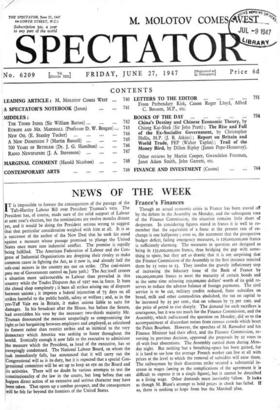France's Finances
Though an actual economic crisis in France has been staved off by the debate in the Assembly on Monday, and the subsequent vote of the Finance Commission, the situation remains little short of desperate. In considering figures stated in francs it is well to re- member that the equivalent of a franc at the present rate of ex- change is one halfpenny ; even so, the statement that the prospective budget deficit, failing emergency measures, is 126,000,000,000 francs is sufficiently alarming. The measures in question are designed to bring in 135,000,000,000 francs, thus bridging the gap with some- thing to spare, but they are so drastic that it is not surprising that the Finance Commission of the Assembly in the first instance rejected them by 15 votes to 13. They involve the gravely inflationary step of increasing the fiduciary issue of the Bank of France by ioo,000,000,000 francs to meet the maturity of certain bonds and at the same time releasing 250,000,000 dollars' worth of its gold re- serves to reduce the adverse balance of foreign payments. The civil service is to be cut, military credits reduced, State subsidies on bread, milk and other commodities abolished, the tax on capital to be increased by 25 per cent., that on tobacco by 75 per cent. and the price of petrol to rise sharply. The demand for such sacrifices is courageous, but it was too much for the Finance Commission, and the Assembly, which rediscussed the question on Monday, did so to the accompaniment of discordant noises from riotous crowds which beset the Palais Bourbon. However, the speeches of M. Ramadier and his Finance Minister had their effect, and the Finance Commission, re- versing its previous decision, approved the proposals by 22 votes to 18 with four abstentions. The Assembly carried them during Mon- day night. But nothing but a breathing-space has been gained, for it is hard to see how the average French worker can live at all with prices at the level to which the removal of subsidies will raise them. The railwaymen by their disastrous strike secured a substantial in- crease in wages (owing to the complications of the agreement it is difficult to express it in a single figure), but it cannot be described as a living wage. Other demands must inevitably follow. It looks as though M. Blum's attempt to hold prices in check has failed. If so, there is nothing to hope from but the Marshall plan.


































